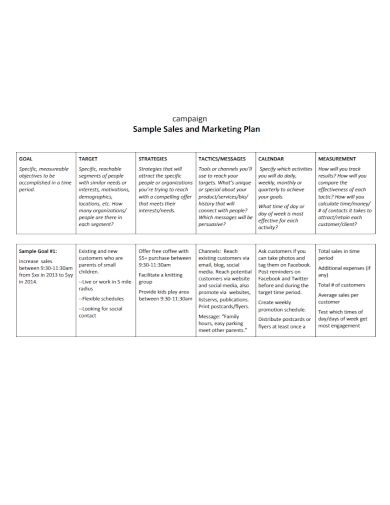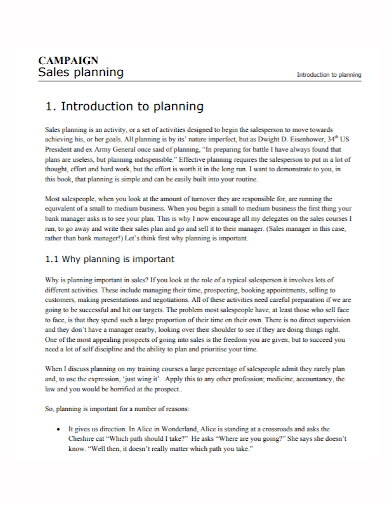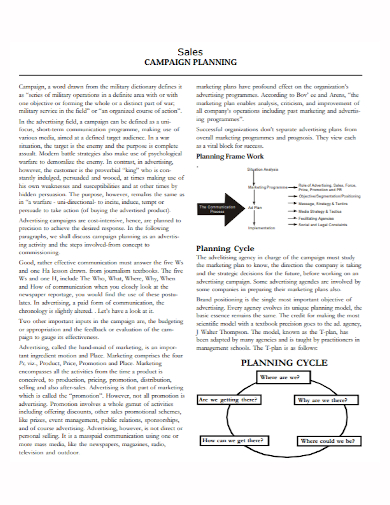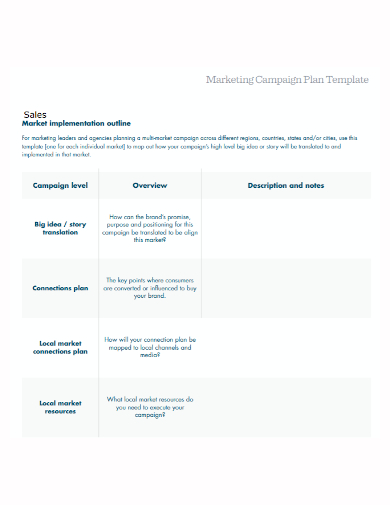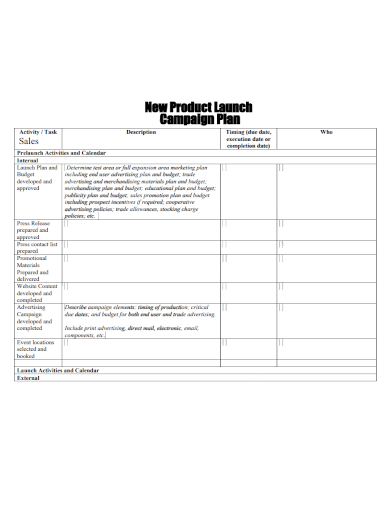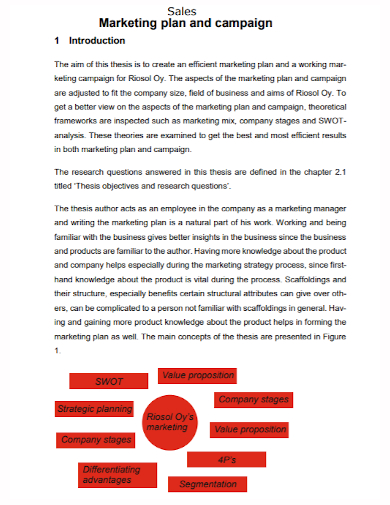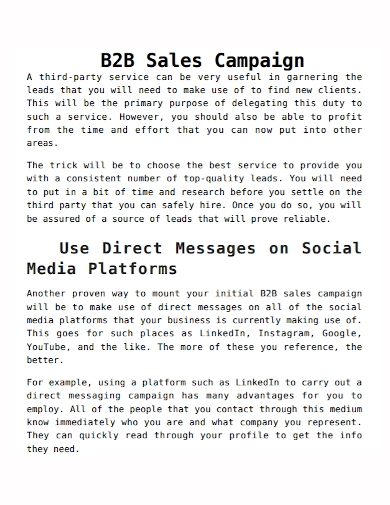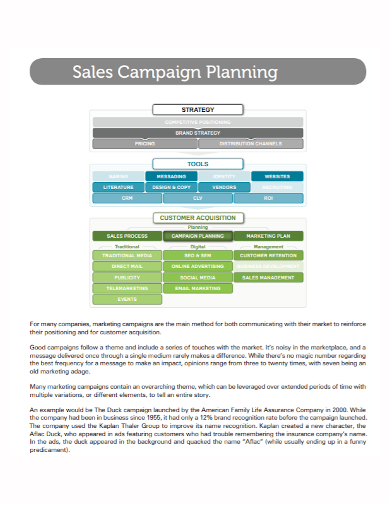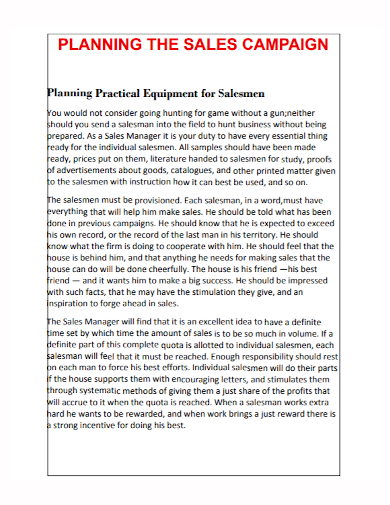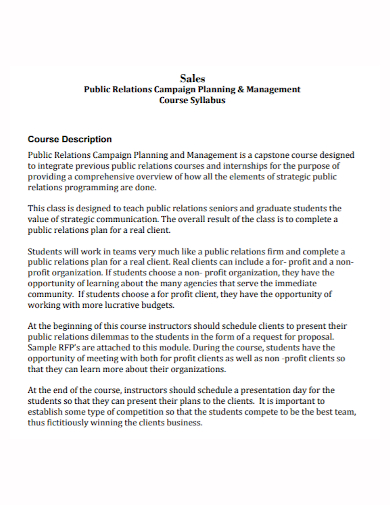When making an end-of-year push for those quarterly targets, successful sales managers use the launch of a sales campaign. It brings people together around a specific, short-term goal that is usually tied to larger yearly goals. Alternatively, sales campaigns can look to capitalize on industry-wide temporal or seasonal trends. So, a good definition of a sales campaign is a set of targets organized around a specific, often temporal sales objective within a specific timeframe. And it’s this timeframe that distinguishes a sales campaign from ordinary “sales work,” giving reps an enticing opportunity to sell and customers a reason to buy.
10+ Sales Campaign Plan Samples
A sales campaign (also known as an “outbound sales plan”) is a set of pre-planned actions taken by your team to convert a specific segment of prospects into customers within a specific time frame.
1. Sales Campaign Plan Template
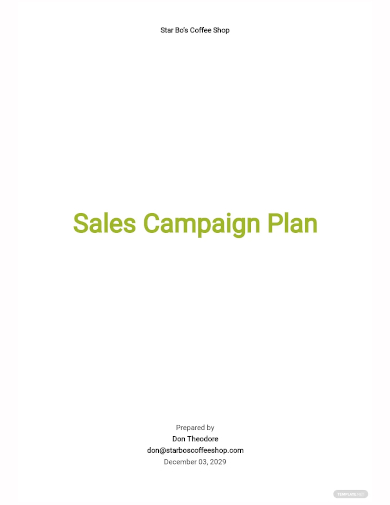
2. Sales and Marketing Campaign Plan
3. Sales Campaign Plan
4. Sample Sales Campaign Plan
5. Sales Campaign Plan Outline
6. Product Sales Campaign Plan
7. Standard Sales Campaign Plan
8. B2B Sales Campaign Plan
9. Sales Campaign Strategy Plan
10. Sales Equipment Campaign Plan
11. Sales Management Campaign Plan
Elements of Successful Sales Campaign
- SMART goals
Specific – Your campaign’s main goal should be well-defined, with clear expectations for all parties involved (i.e. sales/marketing).
Measurable – Metrics must be assigned to goals in order to know when they have been achieved or when you are far from the goal and need to reevaluate.
Attainable – Given the resources you have to devote to it, the goal must be attainable.
Relevant – Campaign objectives must be aligned with the company’s overall objectives.
Time-bound – Campaigns are most effective when they have a beginning and an end, as this motivates the sales team and gives the prospect a sense of urgency. - Defined audience – You must first define who you are targeting in order to build your contact list before you can build a campaign. Are you looking for accounts of a specific size or in a specific region? Do you want to gain new clients or expand your current ones? Are you looking for more sophisticated buyers to purchase your most expensive offering, or are you selling an entry-level product to introduce people to your company? Create personas for each of the people you want to reach with this campaign once you’ve defined who you want to reach. When is the best time to contact them, and how do they prefer to be contacted? The more information you have about your target prospect, the more effective a campaign you can create for them.
- Incorporate qualification – Before making a phone call or sending an email, make sure you’re qualified. Determine what makes a good prospect for your specific campaign and how you will qualify them using the SMART goals and prospect personas mentioned above.
BANT (Budget/Authority/Need/Timeline) is a common qualification method.
What kind of budget does a good prospect require?
What types of titles should the campaign target?
What requirements would a good prospect have?
What is an ideal purchasing timeline, and how does the purchasing process work?Before you even add a contact to a list or reach out, some of these criteria can be fully or partially determined through research. The rest must be revealed within 10 minutes of the initial call, as well as throughout the buying process. - Differentiate from the competition – It’s unlikely that you’re the only business in your industry running sales campaigns. It’s likely that your competitors are already using it. You must know your competitors on a granular level in order to win in accounts where a competitor is present. Do they already have sales campaigns in place? How do they function? What methods are they employing to contact the prospect? What types of offers do they make? What competitive landmines are they likely to have planted against you? What are they doing to position themselves and win against you? How can you position yourself against them and win?
FAQs
What is the sales campaign objective?
It’s time to set some objectives or specific goals for sales reps tasked with executing the campaign once you’ve determined there’s a good enough reason to go ahead and launch it. These goals and objectives will not only serve as a barometer for the success of your sales campaign (they’ll be used to assess your field team’s performance), but they’ll also serve as road markers.
Who is going to execute the campaign?
If it’s a regional sales campaign, it might only be appropriate for the territory’s manager and team. If it’s aimed at a specific vertical, you’ll need to talk to area sales managers who have clients in that industry.
If you’re on track, that’s fantastic! If not, make changes to your sales campaign as a result of your findings. Of course, it’s possible that your goal was overly ambitious, which is especially true if you don’t have previous sales data to draw from when planning your campaign.
Related Posts
FREE 7+ Fashion Business Plan Samples in PDF
FREE 10+ Sprint Planning Samples In MS Word | Google Docs | PDF
FREE 10+ Wedding Planning Samples in MS Word | Apple Pages | Powerpoint | PDF
FREE 9+ Monthly Study Planner Samples in PSD | Illustrator | InDesign | PDF
FREE 9+ Sample Curriculum Planning Templates in PDF | MS Word
FREE 10+ Teacher Development Plan Samples in MS Word | Google Docs | Apple Pages | PDF
FREE 10+ Basketball Practice Plan Samples in PDF
FREE 12+ School Business Plan Samples in PDF | MS Word | Apple Pages | Google Docs
FREE 7+ Client Strategic Plan Samples in PDF | MS Word
FREE 11+ Trucking Business Plan Templates in PDF | MS Word | Google Docs | Pages
FREE 7+ Small Hotel Business Plan Samples PDF | MS Word | Apple Pages | Google Docs
FREE 14+ Bakery Business Plans in MS Word | PDF | Google Docs | Pages
FREE 4+ Yearly Lesson Plan Samples in PDF
FREE 50+ Strategic Planning Samples in Google Docs | Pages | PDF | MS Word
FREE 10+ Construction Project Plan Samples in MS Word | Google Docs | Apple Pages | PDF

